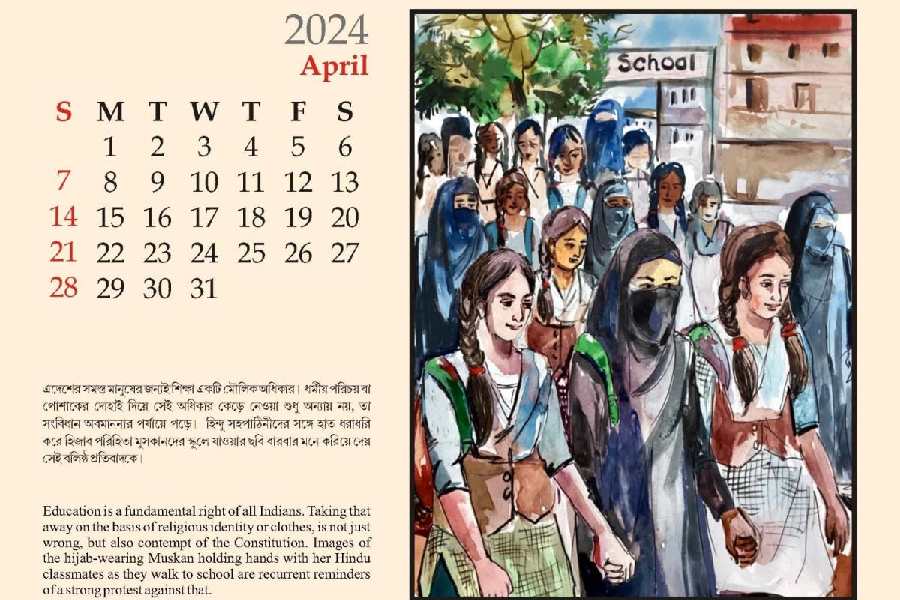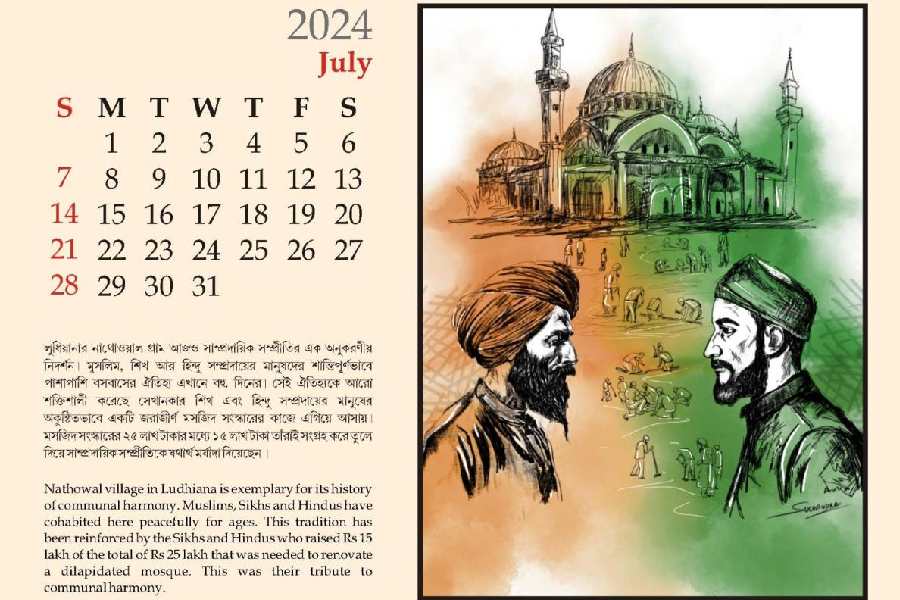A 2024 calendar made by three Calcuttans highlights 12 stories.
The stories, each for a month, celebrate harmony and offer hope against a backdrop of division and bigotry that the makers said threatened to tear the country apart.
Each month’s page has a brief note, in Bengali and English, and an accompanying artwork.
Bon Bibi, a legend of the forest worshipped by Hindus and Muslims alike in the Sunderbans, has made it to the December page.

The April page of the calendar highlights the fundamental right to education.
“In the Sunderbans where crocodiles and tigers attack on water and land, Bonobibi is the only protector of working-class communities. For Hindus she is a Goddess, for Muslims a Peerni. She keeps safe the woodcutters, fishermen, and honey collectors. The compulsions of livelihoods connect Hindus and Muslims and they worship her together before entering the forest,” reads the note.
Bon Bibi is believed to have travelled from Medina to the Sunderbans to protect the people as well as the forests and their animals. Her legend has survived through handwritten manuscripts and orally, through pala-gans and jatras. Legends like her make the popular culture of Bengal syncretic.
The July page has the story of Nathowal village in Ludhiana, Punjab. In 2015, Sikhs and Hindus in the village raised money to renovate a dilapidated mosque.
The note says: “Nathowal village in Ludhiana is exemplary for its history of communal harmony. Muslims, Sikhs and Hindus have cohabited here peacefully for ages. This tradition has been reinforced by the Sikhs and Hindus who raised Rs 15 lakh of the total of Rs 25 lakh that was needed to renovate a dilapidated mosque. This was their tribute to communal harmony.”
The accompanying painting is that of two men, one in a turban and the other wearing a skull cap. A mosque stands in the background.
A detailed introduction on the first page of the calendar explains why the makers chose these stories.
“If the state accepts all communities with equal dignity, then slowly harmony is established. But over the past few years, violence based on religion and caste has become so common. The core of this country, built on love, camaraderie and harmony, seems to have taken a beating with the perpetrators of hate and their politics of othering. But what we often miss are the stories of friendship, compassion and standing with each other of common people that are enacted around us challenging this machinery of hatred. This year, our calendar is an attempt to bring together to light some of these stories. So we remember in our most difficult times that hope lives and shines brightly.”
Mitali Biswas, an independent documentary filmmaker, Sagarika Dutta, an illustrator, and Abir Neogy, who is in the printing business, are behind the calendar.
“We have mainly drawn from the stories that appeared in newspapers. Often, small snippets of hope emerge out of a larger pool of hatred. We want to celebrate those stories,” said Biswas.
Stories of compassion that emerged out of the 2020 Delhi riots and Assam NRC exercise have also made it to the calendar.
The makers are printing around 500 copies. Each would cost Rs 200.
A part of the money collected will be used to pay the artists and designers. The remaining will be used for next year’s calendar, they said.
This is the third year that the three have made a calendar.
In 2021, the subject was women freedom fighters. Last year, it was the role of women in landmark campaigns for justice, like the protests against the citizenship trident of the Centre.
“The promotion is done mainly on social media. Last year, we made 500 calendars and sold all of them,” said Biswas.
Neogy spoke of her apprehensions. “Religious polarisation is taking a monstrous form. It is becoming uglier by the day. The bid to divide people will peak during the upcoming Lok Sabha election. Everyone should protest against this. This calendar is our way of protesting,” she said.
